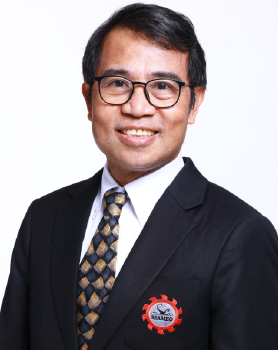
Mr. JOHN ARNOLD SIENA
Deputy Director, Program & Development
SEAMEO Secretariat
Internationalization of Higher Education: Strengthening Institutions, Advancing the Region
Abstract:
In the evolving global landscape of higher education, the pursuit of internationalization is considered as an imperative. For higher education institutions (HEIs) across Southeast Asia, internationalization serves as a transformative force that strengthens institutional capacities, promotes shared excellence, and fosters mutual understanding across borders. Internationalization enables HEIs to respond more effectively to local and global challenges, prepare students for diverse pathways through innovative curricula, and establish platforms for knowledge and resource sharing through meaningful partnerships and consortia.
Colleges and universities perform distinct and complementary roles alongside government, industry, and civil society to advance national and regional development. By themselves, colleges and universities form future leaders and professionals, generate new knowledge through research, inform policies and programs led by other stakeholders informed by higher education data and practice, contribute to societal development through extension programs and outreach, and tackle evolving challenges through design thinking and innovation. By performing these functions, HEIs serve not only as spaces for learning but as drivers of collective progress.
Given this context, internationalization is able to catalyze these core functions. It broadens students’ worldviews, elevates the quality of instruction through faculty development pursued through international exchange and mobility, strengthens systems through international quality assurance mechanisms, implements new modalities for teaching and learning through microcredentials and stackable competencies, and promotes regional integration by preparing students to thrive as global citizens.
However, HEIs face persistent challenges to internationalization. These include the lack of enabling policies, insufficient incentives and support mechanisms to participate in internationalization, limited funding particularly for smaller private institutions, and limited mutual recognition of qualifications.
To this end, three key strategies are proposed to advance efforts in the internationalization of higher education:
1. Recognize internationalization efforts as means to strengthen institutional capacity, and not merely an end goal. Colleges and universities should utilize international benchmarks and metrics as formative tools for institutional improvement, rather than as instruments of competition. Participation in international quality assurance mechanisms should be seen as enabling tools that inform institutions how to improve their programs and offerings, and not to achieve global rankings as an end in itself.
2. Leverage internationalization to drive regional development. Regional partnerships, academic consortia, and cross-border platforms such as those led by the SEAMEO Regional Centre for Higher Education and Development (RIHED), are essential for promoting knowledge exchange, resource sharing, and collaborative problem solving. In particular, SEAMEO RIHED’s Roadmap for Regional Integration advanced regional quality assurance and academic mobility programs, fostering partnerships among institutions and supporting the sustainability of Southeast Asian higher education.
3. Adopt internationalization as a strategic response to future-proof learners and transition them to be stronger global citizens. Through internationalization, colleges and universities are better able to expand student pathways, enable the portability of credentials, and promote learning beyond borders through digital platforms. Internationalization fosters global citizenship education which builds globally relevant competencies, and helps future-proof learners for success in a more digitally connected Southeast Asia.
The Southeast Asian Ministers of Education Organization (SEAMEO) plays a vital role in fostering regional cooperation in higher education. SEAMEO works on higher education on three fronts: (1) engaging directly with SEAMEO Member Countries and its ministries responsible for higher education, in conjunction with the leadership of SEAMEO RIHED; (2) collaborating with our affiliate members including universities such as The University of Tsukuba, The Education University of Hong Kong, and the Southeast Asia One Health University Network to facilitate policy dialogues, conduct capacity building initiatives, and promote research and knowledge sharing; and (3) by itself and with SEAMEO Centers, support student mobility through initiatives like the SEA Teacher Program and the Asian International Mobility for Students (AIMS) which enable college students to gain international experience and contribute to regional development.
By embracing internationalization to advance common goals and shared interests, higher education institutions in partnership with international organizations such as SEAMEO are able to cultivate a global community grounded in continuous development, innovation, and collaboration.
Biographies:
Mr. Siena is currently the Deputy Director for Programme and Development of the Southeast Asian Ministers of Education Organization Secretariat (SEAMES).
Mr. Siena has served as the Director IV of the National Educators Academy of the Philippines (NEAP), Department of Education, the Philippines for almost seven (7) years. He supported the teachers, school leaders and other teaching -related personnel of the Department of Education in the Philippines by ensuring that they are provided with relevant, responsive, and high quality professional development opportunities.
Mr. Siena rose from the ranks starting as a classroom teacher for more than 14 years. He began his leadership journey in the Department of Education as an assistant schools division superintendent and worked his way up to being schools division superintendent, assistant regional director and regional director in the Department of Education.
He holds three (3) master’s degrees – Master of Education major in English from UP in the Visayas (1997), Master in Communication Studies with Distinction under the NZAID scholarship from Victoria University of Wellington, Wellington, New Zealand (2005) and Master in Development Management from Asian Institute of Management (2010).
